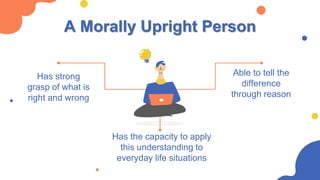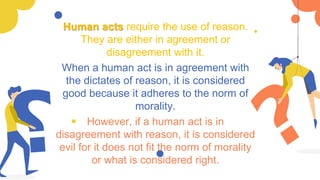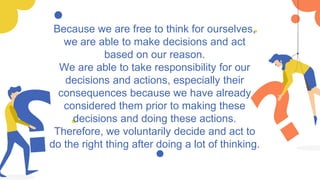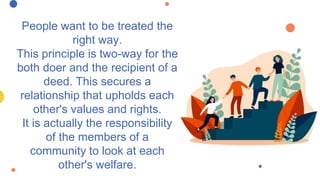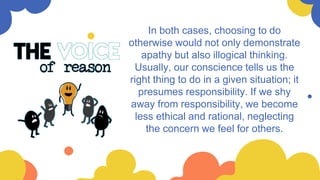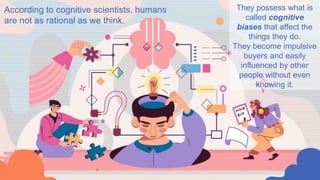VE 10 Q2 Topic 4 We Use Reason in Doing What is Right (Volunteerism).pdf
- 1. We Use Reason in Doing What is Right
- 2. South Lakes Integrated School Second Quarter, SY 2022-2023 Ms. Redgz T. Molidor
- 3. OBJECTIVES Prove that human acts are deliberate and willed by man with the use of reason, so he or she is responsible for their consequences Determine what rewards come with choosing to act according to responsible and ethical ways
- 4. Having the right principles will never yield wrong results. Right principles must be upheld for they are important in the character formation of individuals. Individuals who adhere to their principles can be said to have integrity. They also give importance to clarity and transparency.
- 5. A Morally Upright Person Able to tell the difference through reason Has the capacity to apply this understanding to everyday life situations Has strong grasp of what is right and wrong
- 6. When an object loses its “integrity,” it loses its pristine and original quality. It becomes a corrupted or damaged version. Likewise, the lack of integrity through irresponsibility, lack of ethical commitment, and lack of reasoning results in disintegration.
- 7. Disintegration happens because there is not enough coherence, reliable focus, and credible claims to cling to. The whole shatters and is reduced to its parts, lacking sense and purpose. We become irrational beings who act purely on instinct.
- 8. Being rational means using reason in making decisions and executing actions that we can be responsible for.
- 9. Human acts require the use of reason. They are either in agreement or disagreement with it. When a human act is in agreement with the dictates of reason, it is considered good because it adheres to the norm of morality. However, if a human act is in disagreement with reason, it is considered evil for it does not fit the norm of morality or what is considered right.
- 10. Because we are free to think for ourselves, we are able to make decisions and act based on our reason. We are able to take responsibility for our decisions and actions, especially their consequences because we have already considered them prior to making these decisions and doing these actions. Therefore, we voluntarily decide and act to do the right thing after doing a lot of thinking.
- 11. We only act based on our own reasoning, and we use our life principles as bases for our reasoning. This is due to our strong adherence to personal principles that we are willing to live up to.
- 12. We Honor Our Emotions Through Reason
- 13. by Amanda Marcias The Tragically Powerful Story Behind the Lone German Man Who Refused to Give Hitler the Nazi Salute
- 14. The Tragically Powerful Story Behind the Lone German Man Who Refused to Give Hitler the Nazi Salute During Hitler’s time, the raising of the right arm is a form of salute and respect. However, during Hitler’s government and responsibility, genocide of the Jews took place. Accordingly, there was a man named August Landmesser who refused to salute Hitler. He was part of the Nazi political party.
- 15. The Tragically Powerful Story Behind the Lone German Man Who Refused to Give Hitler the Nazi Salute But he fell in love with a Jewish woman named Irma Eckler. They were engaged to be married, with Irma pregnant. However, when their plan became known, August was expelled from his political party. His refusal to abide by the ruling party’s policy to leave Eckler led him to be imprisoned. He never had a chance to see his wife and child. Eckler gave birth in prison to a child named Irine and was sent to a concentration camp after delivery where she was believed to have been murdered with 14,000 others.
- 16. In the story, it is Landmesser’s love for Eckler that made him decide to do the right thing and remain true to her. You may say that it was Landmesser’s emotion that led him to this decision, but that is not entirely the case. Landmesser chose to stand by Eckler because he honored the existing bond and covenant of love. He thought that it was only right to adhere to that love despite the consequences. He did the right thing by keeping his love for Eckler intact.
- 17. If there is something or someone you hold deeply important, you become willing to go against the crowd because you cherish that thing or person. Integrity involves cherishing your principles at the personal level without being ashamed to stand for them in public. It is only logical that when we love or value something, we become true to it, despite opposition and threats in our lives..
- 19. People want to be treated the right way. This principle is two-way for the both doer and the recipient of a deed. This secures a relationship that upholds each other's values and rights. It is actually the responsibility of the members of a community to look at each other's welfare.
- 20. For many Filipinos, the expression of gratitude is taken up through the expression of concern and responsibility. We want to share what we have to family members who are lacking. Simply, it is the right thing to do as an expression of care. Caring is an ethical expression of right actions and a reason for doing what is right.
- 22. In both cases, choosing to do otherwise would not only demonstrate apathy but also illogical thinking. Usually, our conscience tells us the right thing to do in a given situation; it presumes responsibility. If we shy away from responsibility, we become less ethical and rational, neglecting the concern we feel for others.
- 23. Using Reason to Fight Fake News
- 24. Many people base their idea of responsibility and right actions on lasting principles and concepts such as the value of life, fairness, justice, and caring for the environment. When principles have no lasting significance, they can be twisted to suit things that may serve an abusive purpose. To illustrate this, we may refer to the ”fake news" phenomenon.
- 25. In fake news, facts get twisted and the truth becomes a victim of unethical motives. Many people are demeaned and hurt by becoming targets of this malicious work. However, we can always challenge the unethical with the use of reason. We can evaluate the things that we read, watch, or hear in order to figure out what is true or false.
- 26. Benefits of Doing the Right Thing
- 27. First, it allows us to honor the things that we believe in. The things that we believe in make up who we are and if we respect them, then it shows that we respect and believe in ourselves as well.
- 28. Second, doing the right thing allows us to honor our emotions. Our emotions are solid bases of our decisions and actions. By telling us which feels right or wrong, we are able to consider them carefully before making our decisions or acting upon them.
- 29. Third, we find out the truth about the world. Whenever we decide to do the right thing, we expose the truth about ourselves, others, and the world, which is one of the main goals of us humans. We live for knowledge because we are always in a quest to finding out the truth, and abiding with the norms of morality leads us to these truths. Doing what is right sets our minds to accept the truth and not turn a blind eye or distort it.
- 30. According to cognitive scientists, humans are not as rational as we think. They possess what is called cognitive biases that affect the things they do. They become impulsive buyers and easily influenced by other people without even knowing it.
- 31. “Those who will not reason, are bigots, those who cannot, are fools, and those who dare not, are slaves.” ~George Gordon Byron
- 32. CREDITS: This presentation template was created by Slidesgo, including icons by Flaticon, and infographics & images by Freepik. Thanks Do you have any questions?
- 33. ● https://www.kaskus.co.id/thread/5d9808949a972e13a515b0dd/tragedi -august-landmesser-pria-yang-menentang-hitler/ ● https://www.businessinsider.in/the-tragically-powerful-story-behind- the-lone-german-who-refused-to-give-hitler-the-nazi- salute/articleshow/47896679.cms ● https://www.businessinsider.com/the-lone-german-man-who-refused- to-give-hitler-the-nazi-salute-2015-6 ● https://www.freepik.com/free-photos-vectors/emotion-scale ● https://www.etsy.com/listing/1021736215/kamayan-filipino-art-tagalog ● http://donnadeity.blogspot.com/2016/09/kaluguran-ta-ka.html ● Christian Living for Everyday Life 10 Credits & Sources
- 34. VE 10 Quiz 3 (REASON) Answer Quiz 3 (REASON) pen and paper test. Submit the quiz paper on January 9, 2023 (Monday).





